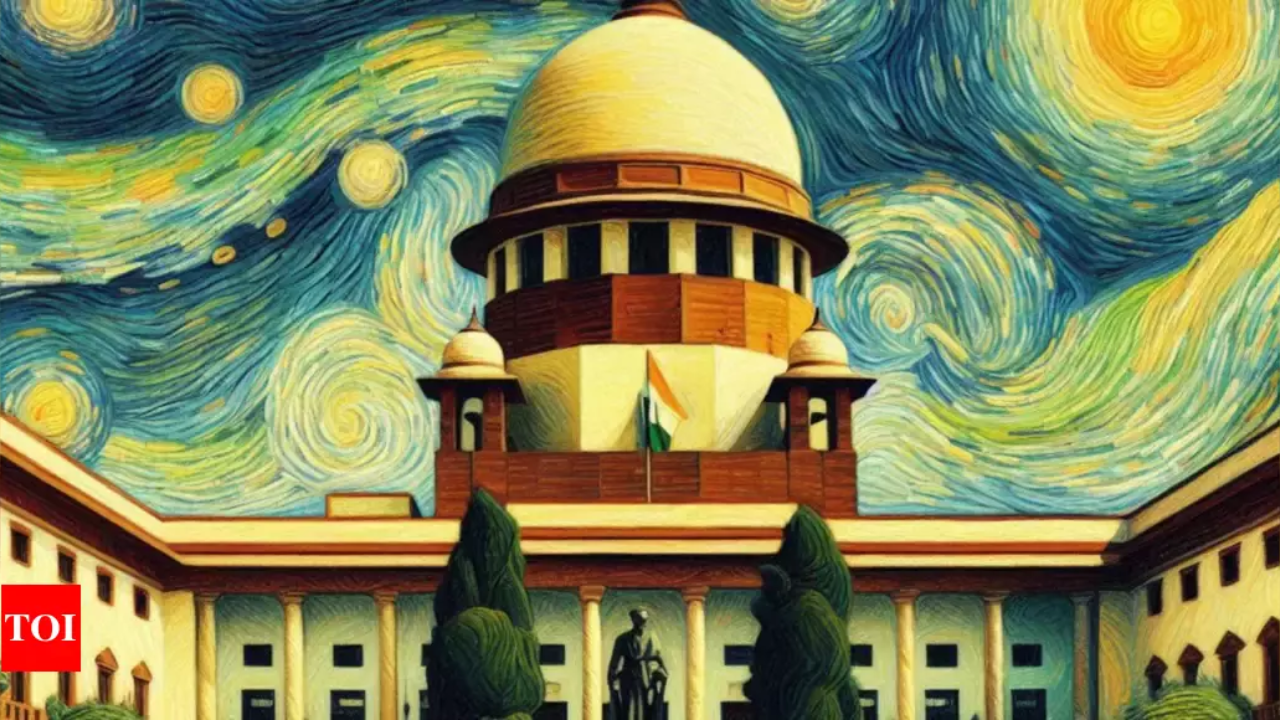[ad_1]
NEW DELHI: Settling a vexed issue that evoked different rulings from HCs, the Supreme Court on Monday adjudged that a person, already arrested and in custody in connection with an offence, is entitled to seek anticipatory bail if he feared that the police may arrest him in another offence.
A bench of Chief Justice D Y Chandrachud, and Justices J B Pardiwala and Manoj Misra said given the state of affairs on the ground, the police may book an accused, already in custody for an offence, in another case and arrest him immediately in that case if he is released on bail in the first case.
“There is no express or implied restriction in the criminal procedure code or in any other statute that prohibits the Court of Session or the High Court from entertaining and deciding an anticipatory bail application in relation to an offence, while the applicant is in custody in relation to a different offence,” the bench said. Writing the 74-page judgment, Justice Pardiwala said, “When procedural law doesn’t preclude the investigating agency from arresting a person in relation to a different offence while he is already under custody in some previous offence, the accused too cannot be precluded of his statutory right to apply for anticipatory bail only on the ground that he is in custody in relation to a different offence.”
Once an accused, who is in custody, is granted anticipatory bail by the court in a subsequent offence, the police cannot seek his remand for interrogation in the second offence, the bench said.
The High Courts of Rajasthan, Delhi and Uttar Pradesh (Allahabad) had taken a view that an anticipatory bail application would not be maintainable if the accused is already arrested and is in custody in connection with some other offence. However, Bombay and Orissa HCs had taken a contrary view. The pre-arrest bail provision was introduced in 1973 in the criminal procedure code.
The bench said if an accused, already under custody for an offence, is granted pre-arrest bail in a different offence, then the police cannot take him in custody for production before the trial court in the second case.
The SC said, “Each arrest a person faces compounds his humiliation and ignominy… The initial arrest itself often brings a wave of social stigma and personal distress, as the individual struggles with the implications of their legal predicament. When a subsequent arrest occurs, it intensifies this emotional and social burden, amplifying the perception of their criminality and reinforcing negative judgments from society.” “Subsequent arrest in relation to different offences, while the individual is in custody in a particular offence, further alienates the individual from their community and adversely affects their personal integrity. For this reason, it is incorrect to assume that subsequent arrests diminish the level of humiliation. On the contrary, each additional arrest exacerbates the person’s shame making the cumulative impact of such legal entanglements increasingly devastating,” it said.
A bench of Chief Justice D Y Chandrachud, and Justices J B Pardiwala and Manoj Misra said given the state of affairs on the ground, the police may book an accused, already in custody for an offence, in another case and arrest him immediately in that case if he is released on bail in the first case.
“There is no express or implied restriction in the criminal procedure code or in any other statute that prohibits the Court of Session or the High Court from entertaining and deciding an anticipatory bail application in relation to an offence, while the applicant is in custody in relation to a different offence,” the bench said. Writing the 74-page judgment, Justice Pardiwala said, “When procedural law doesn’t preclude the investigating agency from arresting a person in relation to a different offence while he is already under custody in some previous offence, the accused too cannot be precluded of his statutory right to apply for anticipatory bail only on the ground that he is in custody in relation to a different offence.”
Once an accused, who is in custody, is granted anticipatory bail by the court in a subsequent offence, the police cannot seek his remand for interrogation in the second offence, the bench said.
The High Courts of Rajasthan, Delhi and Uttar Pradesh (Allahabad) had taken a view that an anticipatory bail application would not be maintainable if the accused is already arrested and is in custody in connection with some other offence. However, Bombay and Orissa HCs had taken a contrary view. The pre-arrest bail provision was introduced in 1973 in the criminal procedure code.
The bench said if an accused, already under custody for an offence, is granted pre-arrest bail in a different offence, then the police cannot take him in custody for production before the trial court in the second case.
The SC said, “Each arrest a person faces compounds his humiliation and ignominy… The initial arrest itself often brings a wave of social stigma and personal distress, as the individual struggles with the implications of their legal predicament. When a subsequent arrest occurs, it intensifies this emotional and social burden, amplifying the perception of their criminality and reinforcing negative judgments from society.” “Subsequent arrest in relation to different offences, while the individual is in custody in a particular offence, further alienates the individual from their community and adversely affects their personal integrity. For this reason, it is incorrect to assume that subsequent arrests diminish the level of humiliation. On the contrary, each additional arrest exacerbates the person’s shame making the cumulative impact of such legal entanglements increasingly devastating,” it said.
[ad_2]
Source link



